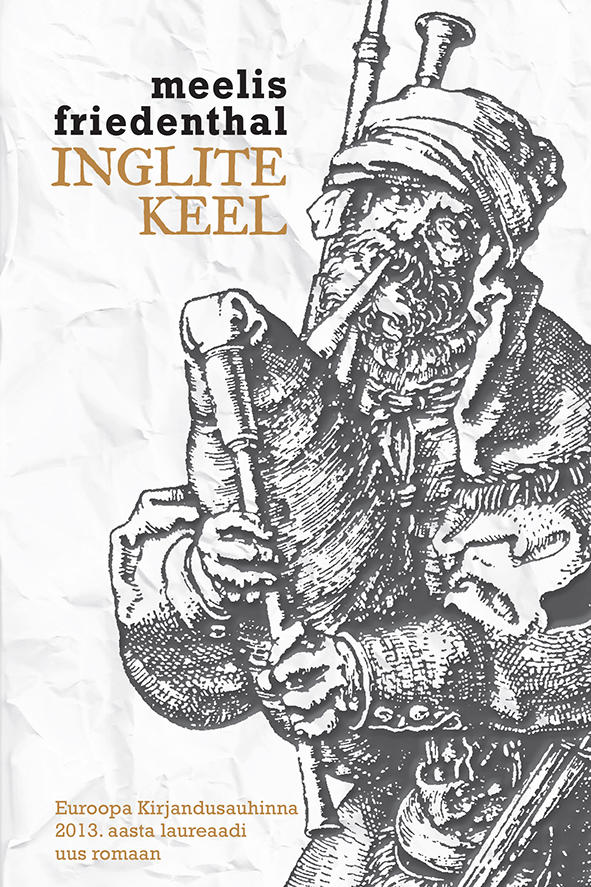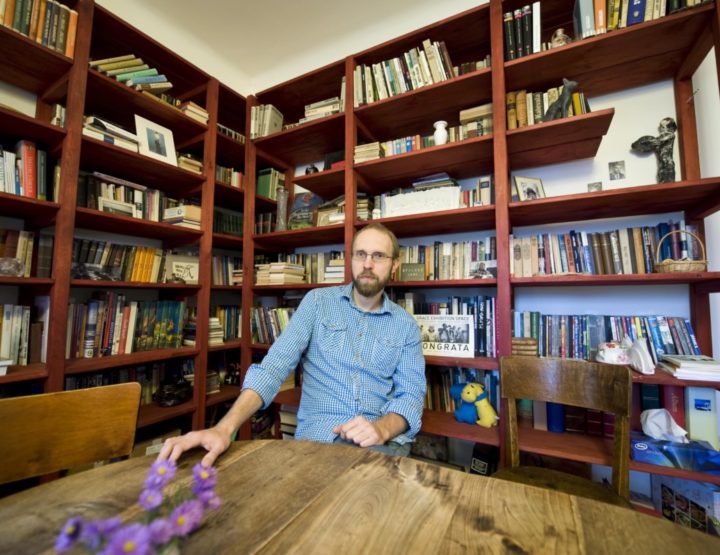Meelis Friedenthal, Inglite keel (The Language of Angels)
Tallinn, Varrak, 2016. 208 pp
ISBN: 9789985337004
Meelis Friedenthal (1973) is a prize-winning prosaist and science-fiction writer. Inglite keel (The Language of Angels) is his third novel, and again features elements of history and fantasy. At every step in the reading process, it is clear that the author is a theologian involved in book– and library history… and like his novel Mesilased (Bees, 2012), which has already been translated into a number of other languages, the plot of Inglite keel revolves around the university town of Tartu, extending out into the “wider world” by way of historical connections and metaphysics.
If Inglite keel were to be made into a film, it would likely be in the horror/mystery genre; something akin to The Ninth Gate, only more Nordically restrained and softer, with a more peaceful trajectory – not intentionally veering into thrill as much, or prying open the locks of evil. It would be a very muted, Estonian (horror-)thriller for library geeks.
I’m unsure whether or not readers should start with the afterword, which gives explanations and is historically intriguing… probably not. It’s always more exciting to find out only at the end of a film that: What do you know?! It was all based on “true events”, in some way, and really is within our reach and in our literary knowledge. This simultaneously demonstrates Friedenthal’s seriousness: he writes out of need; out of an urge. Life has sketched visions of escapades for him; a bizarre world, which to refrain from sharing would be a sin. Yet, there have always been dangers to sharing secret knowledge and endeavoring to acquire it, and these are the dangers that Inglite keel addresses.
The novel is structured like an intriguing chess problem – although in the first chapter, readers may feel like the writer can’t be bothered to flirt with them right away because he doesn’t immediately throw in a twist; bescause he doesn’t stoke thrill from the very start; the following chapters refute this misunderstanding. It is a network, a knotted system of references and intersections that is occasionally even too well-devised. Nothing transpires purely by chance, which intensifies the reader’s paranoia: How many more nodes or references are there here, which I haven’t grasped right away? Will some tiny event turn out to be of crucial importance a couple of chapters later?
In short, there is literary forensic science galore (but, at the same time, not intentionally-excessive thrill) to be found here. Friedenthal’s world is stacked with layers comprising different periods, as well as devices, events, and people that manifest within them anew. At the core is something as thrilling as can be – an old mystical, almost occult 17th-century manuscript (reminiscent of Bees!), which aims to seek divine perfection (i.e. the highest form of the human/angelic expression of divinity). Only… isn’t that the catch? Aren’t demons actually those, who speak in that indistinct, lusted-after, and incomprehensible (but gripping or graspable) angels’ tongue?
Parenthetically, here lies a broader metaphor – literature as a whole is demonology, in a certain respect. We have convinced ourselves (very deeply and genuinely, I might add) that literature possesses some kind of particular manner or opportunity or explanation of existence. And when 20th-century prose reacted to this by ironically warbling about fluff and nonsense, then we arrived at the understanding that an ironic way of thinking is a part of that same redeeming force, likewise. And we felt that we were a smidgen better and nobler once again; just like Friedenthal’s characters cracking open their secret, chasing after an old manuscript, or creating that elusive element, which is both enthralling and magical.
In this sense, I’m reminded of the magician and metaphysician Paavo Matsin (1970)*, who together with Friedenthal can boast a respective EU Prize for Literature (not to mention their similar themes and interests). Matsin’s world and writing style likewise echo the delicate search for demonism. The experience of reading Matsin’s texts constitutes a slightly more dangerous teetering on the brink of murky depths, while Friedenthal’s approach is deliberately spiritually whole and clear. It is, in the classical sense, realistic, historical, psychological, plot– and principle-based prose. Still, the novel’s plot leads us out onto thin ice – the world we are shown is a bizarre mirage, although the manner of narration is not. I might add that the good old, safe canon of realism – presented in a very well-accomplished style in this case – is precisely what enchants the reader.
In the story, the tired old metaphysician and alchemist Michael Maier tells the younger, more aspiring Salomon Maius, who is on a passionate quest for a perfect form of expression; for a book: “Right now, I feel more and more that we must agree with Trithemus’ idea. Alchemy is a maiden whore; she yields to no man’s embraces, ever. Those, who nevertheless reach her leave with empty hands. That which you acquired, you lost. The fool turns mad, the rich man poor, the philosopher a babbler, and the proper man loses any sort of propriety.”
You could say that Friedenthal’s main characters – the Aaron family, who are kind, wise, and soft-spoken old researchers of paper- and print-history – indeed embody a quiet rationalism. They knowingly avoid any kinds of demons or dim reaches, performing their immense task with solemnity; pecking away at what is seemingly small and trifling, and in doing so recognizing that ignorance of some things is sometimes better. Or, contrarily, remembering them. The story revolves around the Aarons’ lost and re-found archive, as well as an old document within it that is strangely alluring (an archive somewhat similar to this truly has gone missing in Estonia), showing how demons (or angels?) attract us, beckon us to join them, and spell out our doom…
Incidentally, the book’s younger, modern-day characters also encounter the inevitable – the library security guards regard physical laborers as somehow better than those who peck away at nothing; irritated for instance by that rare archive being left out in a hallway, underfoot for the honest working-man. And I muse – that really is the case, even with reading nowadays! Most of humankind has grown a nice, thick skin, and won’t be drawn by demons or angels to the pages of dusty books anymore. Those, who allow themselves to be lured by the flight of shadows or light have to acknowledge on their own that, for which they’re settling.
Friedenthal has written sensitively, consciously, and with presence; as if penning a fascinating academic study, which for some reason couldn’t be submitted as scholarly work. It is a mild thriller for the reading and thinking person. I certainly can’t say the ending was unexpected (is it an end at all?), but that’s of no consequence. Rather, I was disappointed that the little knot was unraveled so quickly and tossed towards the next tangles.
* See the review of Paavo Matsin’s prize-winning work Gogoli disko (Gogol’s Disco, Estonian Literary Magazine, Spring 2016, pp 45–46).
Jürgen Rooste (1979) is a poet, journalist, and one of the most renowned Estonian writers of his generation. He has published fifteen poetry collections and received the Cultural Endowment of Estonia’s Award for Poetry on two occasions, among many other literary awards.


